
– 20/3 /2022 –
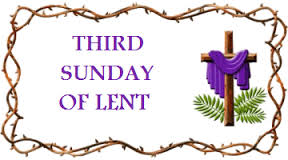
Gospel reading: Luke 13:1-9
vs.1 It was about this time that some people arrived and told Jesus about the Galileans whose blood Pilate had mingled with that of their sacrifices.
vs.2 At this he said to them,
“Do you suppose these Galileans who suffered like that were greater sinners than any other Galileans?
vs.3 They were not, I tell you. No; but unless you repent you will all perish as they did.
vs.4 Or those eighteen on whom the tower at Siloam fell and killed them? Do you suppose that they were more guilty than all the other people living in Jerusalem?
vs.5They were not, I tell you. No; but unless you repent you will all perish as they did.”
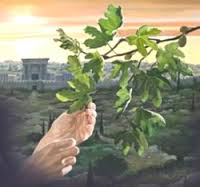 vs.6He told this parable:
vs.6He told this parable:
“A man had a fig tree planted in his vineyard, and he came looking for fruit on it but found none.
vs.7He said to the man who looked after the vineyard, “Look here, for three years now I have been coming to look for fruit on this fig tree and finding none. Cut it down: why should it be taking up the ground?”
vs.8 “Sir,” the man replied, “leave it one more year and give me time to dig round it and manure it:
vs.9 it may bear fruit next year; if not, then you can cut it down.”
*******************************************************
We have four commentators available from whom you may wish to choose .
Michel DeVerteuil : A Trinidadian Holy Ghost Priest, director of the Centre of Biblical renewal .
Thomas O’Loughlin: Professor of Historical Theology, University of Northampton
Sean Goan: Studied scripture in Rome, Jerusalem and Chicago and teaches at Blackrock College and the Le Chéile Schools
Donal Neary SJ: Editor of The Sacred Heart Messenger and National Director of The Apostleship of Prayer.
******************************************************
Michel de Verteuil
Lectio Divina, The Year of Luke
www.columba.ie
General Comments
Verses 1 to 5 are in two groups – 1 to 3 and then 4 to 5; they are practically identical, so that reading them together has a cumulative effect on us. Each is based on a tragic incident: Pilate murdering a group of Galileans as they were offering sacrifice in the temple, and a tower falling and killing eighteen people.
You can start your meditation by identifying a moment when you learnt of (or saw on television) a tragedy where there was violence and bloodshed. The tower was probably a religious building, so that both incidents took place in a religious setting. Then identify with the two possible responses: that of the people, and that taught by Jesus. Note the forceful way in which he rejects the first response. Ask yourself when you have experienced that kind of challenge to what was a natural and spontaneous response.
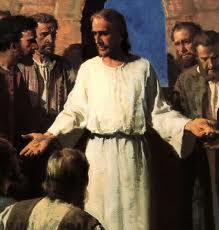 In verses 6 to 9 we have a parable. Interpret it with your feelings. Here again, start with a moment, a time when you or someone else, or a community, had a terrible feeling of uselessness; then identify with the two possible responses, that of the owner, on the one hand, and that of the one who looked after the vineyard, on the other. The designation of one as “owner” and the other as “looking after” is of course highly significant, and the parable is meant to evoke for us a moment of grace, when we experienced the love of God.
In verses 6 to 9 we have a parable. Interpret it with your feelings. Here again, start with a moment, a time when you or someone else, or a community, had a terrible feeling of uselessness; then identify with the two possible responses, that of the owner, on the one hand, and that of the one who looked after the vineyard, on the other. The designation of one as “owner” and the other as “looking after” is of course highly significant, and the parable is meant to evoke for us a moment of grace, when we experienced the love of God.
Scripture reflection
Lord, there is violence in many countries today:
we think of U.S.A, Russia, Ukraine Iraq, Ireland, Algeria, Sri Lanka, Africa, the Holy Land, Pakistan, Syria, Afganistan and elsewhere.
When we see scenes of violence in those countries on our television screens, we may naturally suppose that people there are greater sinners than we are.
Preserve us, Lord, from this kind of complacency;
send us a Jesus person to tell us that it is not so, by any means;
that we too do not respect those whose politics are different from ours;
we too have our racism, prejudice, and our religious intolerance,
and if we do not repent, we will perish as people in those countries are perishing.
Lord, even when we help others, we like to do it from a position of superiority.
We label them “those in need” or “poor sinners” or “those less fortunate than ourselves, “vulnerable people”.
as if they belong to a different breed of people.
Every once in a while, however, you pull us up short:
• we find that we too are sinners;
• someone from a different faith corrects us;
• a person we thought we were helping turns out not to need our help at all.
We feel embarrassed and humiliated,
but that is Jesus reprimanding us because we supposed
that those we were helping were greater sinners than any of us,
whereas we were just as much in need of repentance as they were.
“The hour for action has sounded. At stake are the peace of the world and the future of civilization. It is time for all men and all peoples to face up to their responsibilities.”
…Pope Paul VI – Populorum progressio
Lord, we thank you that recent popes have been speaking with the voice of Jesus,
challenging us to stop looking at violence
as something that happens to individuals because of their sins,
and see it rather as something that has its roots in our civilization,
in particular in our lack of moral principles and our individualism; and unless we repent, we will all perish.
Lord, there was a time when we felt very vulnerable:
• one of our children or family had let us down;
• we were without a job;
• we realised that we were getting old.
We felt useless, as if someone had come to look at us looking for fruit, and had found none;
as if we were merely taking up ground,
and the only thing we deserved was to be cut down and thrown away.
We thank you, Lord, that at such moments you send us friends,
not wishy-washy people who flatter us and pretend that we are without blame,
but real friends like Jesus:
they tell us that indeed we deserve to be cut down,
but that it is not too late, and we can still bear fruit in the future,
and they promise to care for us and help us so that we can make a new start.
Lord, there are people in authority
who look on members of their communities purely as producers,
and are impatient when they do not get results from them.
We find people like that in government, in the church,
and even among parents and teachers.
They are like landowners who have planted trees on their property
and when they come looking for fruit for three years and find none,
they get angry and want to cut down the trees as useless and only taking up ground.
But we thank you, Lord, for those who are different,
who are like you, who have a feel for people
and know that someone who has borne no fruit for many years
could still do so in the future;
they are always ready to try again with people,
trusting that with more care and attention they might bear fruit next year.
Lord, in the world today, when something doesn’t work,
we throw it away and get a new one.
We pray for those who work the land and who have learnt patience from it.
 They know, for example, that trees are precious
They know, for example, that trees are precious
and must not be cut down except as a very last resort,
so that they are always willing to take time to dig around them and manure them,
in case they might still be capable of bearing fruit;
in this way they are a parable of your love for us,
and of how you want us to treat one another.
Lord, when we think of weapons of mass destruction, nuclear war hanging over us,
we feel as if you have given humanity one more year,
to see if we will bear fruit and if not then we will all be cut down.
**********************************************
2.Thomas O’Loughlin,
Liturgical Resources for the Year of Luke
www.Columba.ie
Introduction to the Celebration
In today’s gospel we will hear again the urgent call of the Christ to change our way of life, to repent, to begin a new relationship with God our Father. This repentance is part of his Good News as it begins the process of being his ministers building the New Creation. As we begin our Eucharist, let us recall our need to renew our lives and ask that this Eucharist will strengthen our resolve to lead renewed lives.
Homily Notes
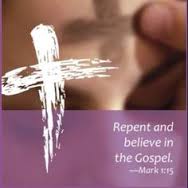 1. During Lent the themes of repentance and reconciliation are very much part of the liturgy. These two themes are intimately intertwined: repentance is possible because God is offering us reconciliation, and being reconciled with God involves the commitment to a new style of life and building the new creation made available in Christ. The call to repent is the call to turn over a new leaf, to begin afresh; reconciliation is the fruit of this turning around and links the personal new beginning with the work of the whole body of Christ to establish the kingdom of peace and love.
1. During Lent the themes of repentance and reconciliation are very much part of the liturgy. These two themes are intimately intertwined: repentance is possible because God is offering us reconciliation, and being reconciled with God involves the commitment to a new style of life and building the new creation made available in Christ. The call to repent is the call to turn over a new leaf, to begin afresh; reconciliation is the fruit of this turning around and links the personal new beginning with the work of the whole body of Christ to establish the kingdom of peace and love.
2. What is brought out in today’s gospel is that the possibility of repentance is continually offered to us. But the actual act of turning is a painful process of evaluating our lifestyle, actions, and attitudes – a process far more painful that just the trip to the confessional.
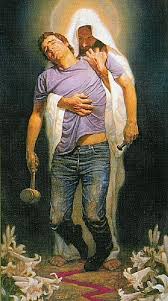 3. In preaching today, the task is to locate the personal act of turning within the whole process of reconciliation inaugurated by Christ who reconciled the world to God through his suffering and death. Carrying on this process is the task of the whole body of Christians, our ‘ministry of reconciliation’ (cf 2 Cor 5:18). Reconciliation, at this level, is the establishment of new creation – and it links evangelisation, and work for peace and justice in the world. Thus, almsgiving has always been seen as a key element in personal penance. This larger process of reconciliation must also find a parallel at the individual level: a search for a greater personal integrity, a willingness to forgive wrongs done to us, and a willingness to renew our relationships with those around us.
3. In preaching today, the task is to locate the personal act of turning within the whole process of reconciliation inaugurated by Christ who reconciled the world to God through his suffering and death. Carrying on this process is the task of the whole body of Christians, our ‘ministry of reconciliation’ (cf 2 Cor 5:18). Reconciliation, at this level, is the establishment of new creation – and it links evangelisation, and work for peace and justice in the world. Thus, almsgiving has always been seen as a key element in personal penance. This larger process of reconciliation must also find a parallel at the individual level: a search for a greater personal integrity, a willingness to forgive wrongs done to us, and a willingness to renew our relationships with those around us.
Neither the larger process nor the individual process can be carried out alone; the Christian message is not one of individual salvation independent of the other humans and the community, nor is the church simply a movement for a better world.
4. These two themes have to be preached together, and equally both have to be present in communal celebrations of reconciliation during Lent.
**********************************************
3. Sean Goan
Let the reader understand
www.columba.ie
Gospel
The scene presented here is one in which Jesus challenges the traditional view that if something bad happens to you then it must be some form of punishment from God. Jesus rejects this idea and instead tells his listeners that any experience of hardship should be a reminder to us of the need to repent. This idea is then put beside the image of God as the gardener who wants to give his plants all the help they need to mature and bear fruit. This gospel also gets to the heart of what Lent is all about. True repentance is not about being obsessed with sin – it is about recognising where God is at work in our lives and responding to him.
Reflection
What’s in a name? When God refused to give Moses an answer to his question, he was breaking the mould for how human beings relate to God. She/He cannot be made in our image or likeness; rather we must learn to be like God, Moses was living the quiet life of the shepherd when he was called to lead a whole people to freedom, and in the unfolding story he came to know God in a way that he could never have imagined. So too with Paul, who thought he knew God until his experience of the risen Christ changed his life. Their experience did not make them arrogant or proud; rather it taught them that in all the circumstances of their lives God’s grace would be sufficient for them.
*******************************************************
4. Donal Neary S.J.
Gospel reflections
www.messenger.ie/bookshop/
God of the second chance: The fig tree
This seems a rather strange story about Galileans being killed by Pilate. They were no greater sinners than others, but people thought they were being punished by God. Jesus asks us to repent, but does not punish the sinner. Repent is the word of Lent – and followed by the invitation to believe the good news of the gospel.
A fig tree had three years to get good. It is a precious tree because it uses little water. This one has not produced its fruit. Is God the one to get rid of the tree or the one to give it another chance? God is the God of the second chance all the time.

Never give up on his love! We may need to give God another chance. We know we get angry at times. People find that many good things can happen even in bad times. Let’s have that faith and pray for it. God gives us chance after chance in our lives, as He wants our faith in him to grow.
We ask also that we now give the Church another chance. So this is a day of more chances, that life never folds up. We need to return more and more to the gospel and the goodness of so many people, which will lead us in our Church communities to Christ. We do not belittle some terrible things that happened, nor lessen our care for those abused, but ask to take a deeper step to the God who is the one giving and asking us for another chance!
Renew us O Lord,
in love, in hope and in joy
in your care for us.
***************